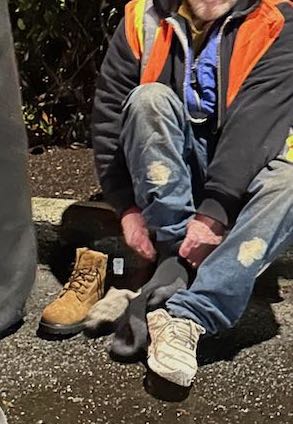Let’s break down the reasons people are homeless and why towns and cities may refuse to care for them:
And offer a solution…
Top 5 Reasons People Are Homeless:
1. **Lack of Affordable Housing:** The shortage of affordable housing is a significant factor contributing to homelessness. High rental costs, low wages, and limited housing assistance programs can force individuals and families onto the streets.
2. **Poverty:** Poverty is a root cause of homelessness. People living in poverty often lack the financial resources to maintain stable housing, access healthcare, or cover basic needs.
3. **Mental Illness:** Mental health issues such as schizophrenia, bipolar disorder, and depression can lead to homelessness when individuals do not receive proper treatment and support.
4. **Substance Abuse:** Drug and alcohol addiction can contribute to homelessness by impairing decision-making abilities, straining relationships with family and friends, and leading to job loss.
5. **Domestic Violence:** Survivors of domestic violence may become homeless as they escape abusive situations and struggle to find safe and stable housing.
Top 5 Reasons Towns and Cities Refuse to Care for the Homeless:
1. **NIMBY (Not In My Backyard) Syndrome:** Some communities resist homeless shelters or services due to fears of decreased property values, increased crime rates, or negative effects on local businesses.
2. **Budget Constraints:** Towns and cities may cite limited financial resources as a reason for not providing adequate support for the homeless population.
3. **Stigma and Discrimination:** Negative stereotypes and misconceptions about homelessness can lead to discrimination against homeless individuals, making it challenging to garner public support for homeless initiatives.
4. **Lack of Coordination:** Inefficient coordination among government agencies, nonprofits, and community organizations can hinder efforts to address homelessness comprehensively.
5. **Political Will:** A lack of political will and leadership at the local level can result in inadequate policies and resources dedicated to homelessness prevention and intervention.
A Solution to Shelter the Homeless in a Loving Way:
To address homelessness compassionately and effectively, communities can implement the following strategies:
1. **Housing First Approach:** Prioritize providing stable housing to homeless individuals without preconditions such as sobriety or employment. Housing stability is essential for individuals to address other challenges effectively.
2. **Wraparound Services:** Offer comprehensive support services such as mental health counseling, substance abuse treatment, job training, and healthcare to address the underlying causes of homelessness and help individuals rebuild their lives.
3. **Community Collaboration:** Foster partnerships between government agencies, nonprofits, faith-based organizations, businesses, and community members to coordinate efforts, share resources, and maximize impact in addressing homelessness.
4. **Education and Advocacy:** Raise awareness about the root causes of homelessness, combat stigma, and advocate for policies that prioritize affordable housing, healthcare access, and social services for vulnerable populations.
5. **Empowerment and Dignity:** Treat homeless individuals with respect, dignity, and empathy. Involve them in decision-making processes, empower them to participate in their own recovery journey, and provide opportunities for social inclusion and community engagement.
By adopting a holistic, human-centered approach that combines housing solutions with supportive services and community engagement, towns and cities can create a more compassionate and sustainable system to care for the homeless population.
Robin Campbell
Manna Homeless Society
Box 389
Errington BC
VOR 1VO

 The wide range of items we are distributing such as coats, tents, sleeping bags, tarps, shoes, socks, food energy, drinks, gloves, and hats are crucial for ensuring the safety and well-being of individuals facing homelessness or exposure to harsh weather.
The wide range of items we are distributing such as coats, tents, sleeping bags, tarps, shoes, socks, food energy, drinks, gloves, and hats are crucial for ensuring the safety and well-being of individuals facing homelessness or exposure to harsh weather. Manna has a friend who is 67 years old and lives in his car. Bob served our country and also worked until he couldn’t work anymore… Bob has diabetes and related health issues – swollen legs, feet problems, etc…
Manna has a friend who is 67 years old and lives in his car. Bob served our country and also worked until he couldn’t work anymore… Bob has diabetes and related health issues – swollen legs, feet problems, etc…